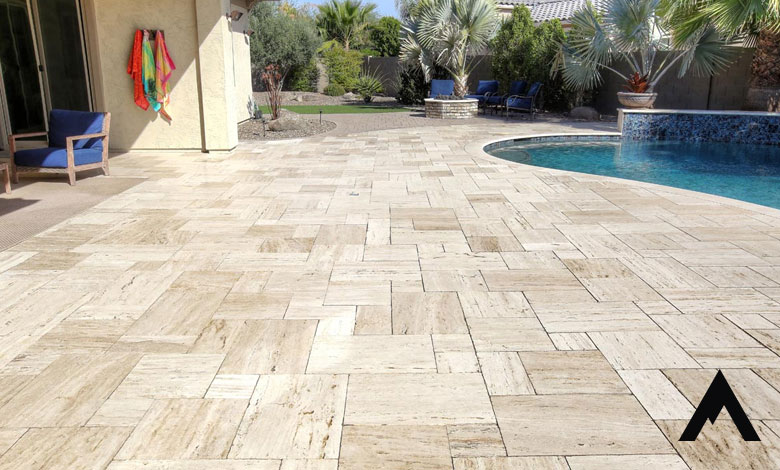The aesthetic look of travertine makes it a fine candidate for your pool deck. However, some travertine pool deck problems are presented here so you can decide whether it is a good option for you or not.
What is travertine?
Travertine has been widely used in construction since ancient times. Even nowadays, still travertine is popular. No matter whether your building has a modern or a classical style, travertine fits best. Like many other natural stones, travertine comes in different colors such as white, tan, cream-colored, and rusty varieties that can match almost any design or architecture. It is used for indoor home or business flooring, outdoor patio flooring, spa walls and ceilings, façades, and wall cladding, especially in modern architecture. It is far more elegant than concrete paver but less stylish than marble and granite.
What about pool decks?
Travertine is widely used for pool decks. There is a good reason for that. Travertine tiles have an undeniably stunning look! However, that is not the only reason. The natural stone of travertine has some functional characteristics that make it a good candidate for pool decks. But, there are also significant Travertine pool deck problems. If you are interested in both pros and cons of travertine pool decks, they are presented here.
What are the pros of a travertine pool deck?
There are lots of reasons for choosing travertine pavers for pool decks including:
- Having a non-slip surface: slipping on the floor is one of the most critical concerns when it comes to pool decks. No one likes their children to slip and fall down on a wet surface while they are enjoying a pleasant summer afternoon. As travertine is a porous rock, its texture is naturally non-slippery. This porous nature enables the travertine to absorb water that is pushed to the deck from the pool. Because of this characteristic, travertine is also the best choice for bathrooms, showers, and outdoor floors in areas with heavy rains as it makes it more difficult for water to remain in puddles.
- Being heat resistant: If you live in an area with hot weather, you like to swim in the cool water to keep cool. A travertine pool deck makes it easier as it transfers the cool, low temperatures from the Earth while reflecting the sun’s heat. You can enjoy the pool even at midday without worrying about burning your feet.

- Being very durable: Not only is travertine safe but also it is very durable, and does not crack easily, and harsh weather cannot affect it that much due to its resilient characteristic, which makes it the best choice for pools. In other words, with proper care, accurate installation, and not being subjected to extreme wear and tear, average-grade travertine tiles last over 100 years!
- Being more economical: money is always the most important factor when it comes to design. Although travertine is as durable and good-looking as marble or granite, it is far cheaper than those kinds, about half of those prices. This has another advantage as well! Are you tired of your travertine pool deck appearance? You can easily redesign it with some other travertine tiles.
- Having a timeless look: Travertine looks like it had been there for many years, which is why it has a timeless look. Also, it comes in different colors and patterns and everyone can choose the one he desires. Even if cracks happen on travertine tiles, fortunately, they are not noticeable. The reason is that travertine like any other natural stone has natural veins itself. So, even may the cracks add a rustic appeal to your pool decks.
Although all these advantages are enough for choosing this kind of paver, there are some travertine pool deck problems worth mentioning.
Travertine pool deck problems
- It can be slippery: although being non-slippery is one of the characteristics of travertine, it can be slippery if pool finishes are not chosen or done properly. So, be careful to apply a non-slippery coating when you are sealing your pool deck.
- It is sensitive to acidic substances: as it was mentioned before, travertine paver is durable. Still, it is sensitive to alcohol, vinegar, coffee, orange juice, lemon juice, and any other material which is acidic. When something like a drop of lemon juice spills on travertine, there is always the risk of a permanent stain as the acidic substance solves that part of the stone. when this happens, there are some solutions for it, though, it may need immediate and repeated action.

- It requires maintenance and care: Tough travertine is more resilient and durable, but it needs more attention in comparison to other options such as granite or marble. As travertine is porous, it allows spilled liquids to go into it and get further damage. To address this problem, first, be careful with your drinks and food when you are having a pool party. Also, you can apply a sealant to your pool deck. Moreover, pay attention to the type of cleaning material you use for cleaning the travertine pool deck.
- It is heavy: As travertine is a heavy stone, it should be applied with care. The underneath layer should be strong and resilient because of that the deck should be thoroughly stabilized.
Having said these advantages and travertine pool deck problems, if you still want to pave your pool deck with travertine, ABYstones provide you with more than 10 different kinds of travertine. It gives you the chance to choose from different colors and patterns that can fit any taste and style. Even if you decide not to choose travertine for your pool deck, more than 120 different models of stones are available in the 2000-meter square ABY hall in Musqat. ABY’s reliability is confirmed by more than 70 architectural groups and 120 stone traders in the middle east alone, so there should not be any worries about the quality of the stones.

